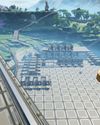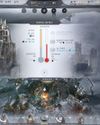
Since its release in the summer of 1999, Deus Ex has become one of the most beloved games on PC. Set in a bleak cyberpunk future, Ion Storm’s ambitious first-person RPG, which was directed by Warren Spector, features deep systems, sprawling levels, emergent play, and a thrilling, conspiracy-laden plot. But one afternoon in Austin, Texas, where the game was developed, designer Harvey Smith and other members of the team were convinced that the game they’d been working on for years was destined for failure.
“We brought in Caroline Spector, Warren’s wife, and she was the first person outside of the team to play it,” says Smith. “She got off the boat at the dock, and she picked up a box and threw it into the water. She got into the water and swam around. She tried to interact with a seagull. Then she tried to float on top of the crate.”
It’s worth noting that, in 1999, being able to manipulate physical objects in a realistic, simulated world was more of a novelty. This experimentation continued for 20 minutes as Harvey and the others watched over her shoulder, filled with dread. “We were gnashing our teeth,” remembers Smith. “We were like ‘God, we’ve failed. She’s not even starting the mission! She’s just screwing around on the dock with all the stuff I put on there’.”
But then, suddenly, she turned to the anxious developers and told them in no uncertain terms that this was the most fun she’d ever had playing a game. “We were like ‘She enjoyed that?’. So we just doubled down on these quiet moments in the levels and the object physics. We believed in these things, but it was validating to hear it from someone else.”
This story is from the {{IssueName}} edition of {{MagazineName}}.
Start your 7-day Magzter GOLD free trial to access thousands of curated premium stories, and 9,000+ magazines and newspapers.
Already a subscriber ? Sign In
This story is from the {{IssueName}} edition of {{MagazineName}}.
Start your 7-day Magzter GOLD free trial to access thousands of curated premium stories, and 9,000+ magazines and newspapers.
Already a subscriber? Sign In

"The War Within itself has kept me coming back most evenings too"
WORLD OF WARCRAFT remains my jailer, and I couldn't be more pleased about it

OK BUILDER
SATISFACTORY is the new titan in building and crafting games

HELL YES
DIABLO IV: VESSEL OF HATRED is a transformative expansion

MOUSE: PI FOR HIRE
This mouse wants to be more than just a gimmick

WINDBLOWN
Dead Cells dev's new roguelike has me afraid for my free time

NO MORE ROOM IN HELL 2
As the zombie horde surrounded me just moments after taking down my two remaining teammates, the writing was really on the wall. Armed with just a chef's knife, it was clear I stood no chance, but I was going down swinging, hoping for a miracle... it didn't come.

OWNED BY STEAM
VALVE cordially reminds you that your games aren't yours

CURSE OF THE AZURE BONDS
These classic games haven't aged badly, but I sure have.

DEEP FREEZE
Endure a blizzard of tough choices and rough consequences in FROSTPUNK 2

NEW HORIZONS
Building up REMNANT 2 outside the live service game grinder